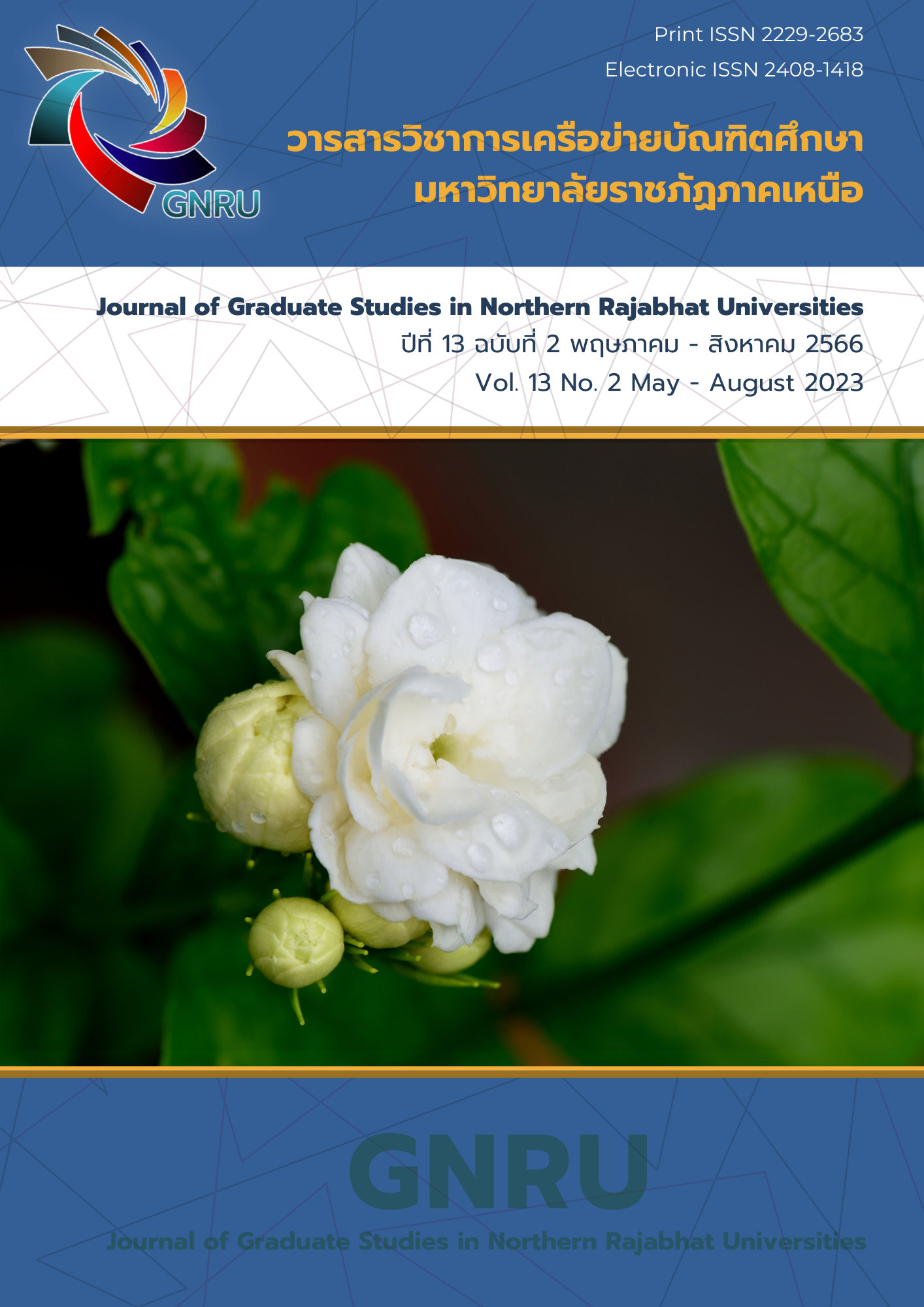7 An Online Scale Measuring Desirable Characteristics in Discipline, Learning, and Work Commitment of High School Students, Uttaradit Daruni School
Main Article Content
Abstract
The purposes of this research were to (1) analyze the components of Desirable Characteristics in Discipline, Learning, and Work Commitment, (2) analyze the construct validity, concurrent validity and reliability of the scale measuring the desirable characteristics in the high school student curriculum, Uttaradit Daruni school, (3) construct the criteria for interpreting the score scale of Desirable Characteristics measurement tools, and (4) analyze the influences of the study year, GPA, family status and a relationship between student and peers on the desirable characteristics. An accidental sampling was 1,210 students. A purposive sampling was 9 teachers and 30 students for each side. The results revealed that (1) there were 3 components of desirable characteristics in discipline, learning and work commitment and 26 - 27 observable variables for each side. All three tools were structurally correct with the goodness of fit test, the Reliability of tools were 0.949 – 0.977, and the concurrent validity of these tools were 0.904 - 0.957. There were 4 levels of characteristics quality criteria namely, fail, pass, good and excellent. The relationship of student and peers, sex, cumulative average grade, year and family status factors had influences on these desirable characteristics in terms of 33.4% - 40.4%. The influencing factors were found to be relationship between students and peers, cumulative grade point average and year.
Article Details
References
Ajdej, N., (2012). Construction of Desirable Characteristics scale on Discipline for Secondary school grade first students of the Secondary Educational Service Area Office 27. Master of Education, Maha Sarakham Rajabhat University.
Artrith, N.. (2017). Factors Affecting Self- Discipline of 10th Grade Students under theSecondary Educational Service Area Office 2. Master of Education, Rajabhat Maha Sarakham University.
Bobbio, A., & Manganelli, A. M. (2011). Measuring social desirability responding. A short version of Paulhus’ BIDR 6 Testing. Psychometrics Methodology in Applied Psychology, 18(2), 117-135.
Chomphu, A., (2016). The Development of Measure Desirable Characteristics of Students as Based on the Core Basic Education Curriculum B.E. 2551 (2008). Veridian E-Journal,
Silpakorn University, 9(3), 358-369.
Constitution of the Kingdom of Thailand B.E. (2017 ). Government Gazette. Volume 134, Chapter 40A, P 14.
Lee, M., Whitehead, J., and Ntoumanis, N.. (2007). Development of the attiudes to moral decision-making in youth sport questionnaire. Psychology of Sport and Exercise, 8(369 - 392).
Ministry of Education Office of Educational Standards and Education. (2011), Basic Education Core
Curriculum 2008. (Edition 3), Bangkok., Agricultural Cooperative Council of Thailand Printing House.
Nakrapanich, S.. (2021). Predicting Factors Of Resilience Quotient Of The First-Year Nursing Students, The Thai Red Cross College Of Nursing. The Journal of Psychiatric Nursing and Mental Health, 35(1), 128-145.
National Education Act, B.E. (1999). Royal Gazette. Volume 116, Chapter 74a. P 1.
Nontasri, P., (2017). The Development of an Electronics Learning Package to Measure Desirable Attribute of Learning Enthusiasm Behavior Based on Basic Educational Core Curriculum B.E. 2551 for Mathayomsueksa 4 Students at the Schools Under the Secondary Educational Service Area Office 19 (Loei). Academic Journal of Phuket Rajabhat University, 13(2), 109-127.
Nunsena, P., (2017). The Parents’ Paticipation to Promote The Dissirable Characterristics Of Students Under The Secondary Educational Service Area Office 18. Master of Education, Burapha University.
Petchsuk, R.. (2013). Factors influencing the intention to alcohol consumption of high school students in Bangkok. Thai Journal of Nursing, 62(4), 20-26.
Saenglertuthai C.. (2009). Factors Affecting On Self- Discipline Of Student Nakhon Pathom Rajabhat University. Journal of Education Khon Kaen University, 32(4), 47-53.
Srisa-at,B. (2003). Curriculum development and research on curriculum. Bangkok: Suviriyasasana.
Sukjai, C.. (2017). The Development of Desirable Characteristics Scale of Lower Secondaryschool Student Based on Basic Education Core Curriculum B.E. 2008. Master of Education, Chulalongkorn University.
Suwitthayarat, K. (2018). The Development of Desirable Student Characteristics Through Homeroom Activities. Doctor of Philosophy, Songkhla Rajabhat University.
Tate, R. (1998). An Introduction to Modeling Outcome in the Behavioral and Social Sciences. Minesota: Burrges International Group, Inc.
Thongsila, S.. (2014). Affecting Factors Of Self- Discipline of Lower Secondary School Students In The Secondary Education of Service Area Office 2, Bangkok. Master of Industrial Education In Educational Administration, King Mongkut’s Institute of Technology Ladkrabang.
Wichiranont, S.. (2010). Factors Relating to the Lack the Virtue of Honestry in Students’ Learning. MUTP Research Journal, 4(2), 97-104.


